
Francis Kwame Nkrumah was a Ghanaian politician, political theorist, and revolutionary. He served as Prime Minister of the Gold Coast from 1952 until 1957, when it gained independence from Britain. He was then the first Prime Minister and then the President of Ghana, from 1957 until 1966. An influential advocate of Pan-Africanism, Nkrumah was a founding member of the Organization of African Unity and winner of the Lenin Peace Prize from the Soviet Union in 1962.

The area of the Republic of Ghana became known in Europe and Arabia as the Ghana Empire after the title of its Emperor, the Ghana. Geographically, the ancient Ghana Empire was approximately 500 miles (800 km) north and west of the modern state of Ghana, and controlled territories in the area of the Sénégal River and east towards the Niger rivers, in modern Senegal, Mauritania and Mali. The empire appears to have broken up following the 1076 conquest by the Almoravid General Abu-Bakr Ibn-Umar. A reduced kingdom continued to exist after Almoravid rule ended, and the kingdom was later incorporated into subsequent Sahelian empires, such as the Mali Empire. Around the same time, south of the Mali empire in present-day northern Ghana, the Kingdom of Dagbon emerged. The decentralised states ruled by the tindaamba were unified into a kingdom. Many sub-kingdoms would later arise from Dagbon including the Mossi Kingdoms of Burkina Faso and Bouna Kingdom of Ivory Coast. Dagbon pioneered Ghana's earliest learning institutions, including a university town, and a writing system prior to European arrival.

Sylvanus Épiphanio Olympio was a Togolese politician who served as prime minister, and then president, of Togo from 1958 until his assassination in 1963. He came from the important Olympio family, which included his uncle Octaviano Olympio, one of the richest people in Togo in the early 1900s.
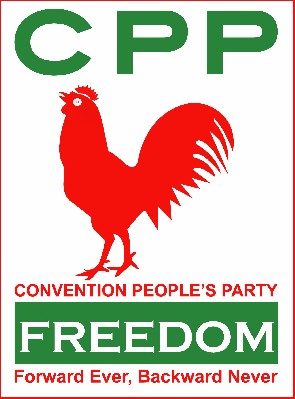
The Convention People's Party (CPP) is a socialist political party in Ghana based on the ideas of the first President of Ghana, Kwame Nkrumah. The CPP was formed in June 1949 after Nkrumah broke away from the United Gold Coast Convention (UGCC).
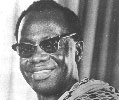
Kofi Abrefa Busia was a Ghanaian political leader and academic who was Prime Minister of Ghana from 1969 to 1972. As a nationalist leader and prime minister, he helped to restore civilian government to the country following military rule.

Joseph Kwame Kyeretwie Boakye Danquah was a Ghanaian politician, scholar, lawyer and statesman. He was a politician in pre- and post-colonial Ghana, which was formerly the Gold Coast, and is credited with giving Ghana its current name.

The Parliament of Ghana is the legislative body of the Government of Ghana.

The prime minister of Ghana was the head of government of Ghana from 1957 to 1960 and again from 1969 to 1972.
The United Gold Coast Convention (UGCC) was first nationalist movement with the aim of self-government " in the shortest possible time" founded in August 1947 by educated Africans such as J.B. Danquah, A.G. Grant, R.A. Awoonor-Williams, Edward Akufo Addo, and others, the leadership of the organisation called for the replacement of Chiefs on the Legislative Council with educated persons. whose aim was to bring about Ghanaian independence from their British colonial masters after the Second World War. The United Gold Coast Convention appointed its leaders to include Kwame Nkrumah, who was the Secretary General. However, upon an allegation for plans against Nkrumah's leadership, he was arrested and jailed. The UGCC leadership broke up and Kwame Nkrumah went on a separate way to set up the Convention People's Party (CPP) for the purpose of self-governance. The UGCC was founded in Saltpond.
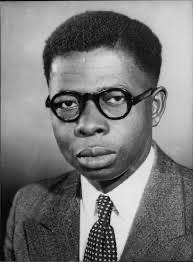
Ako Adjei, was a Ghanaian statesman, politician, lawyer and journalist. He was a member of the United Gold Coast Convention and one of six leaders who were detained during Ghana's struggle for political independence from Britain, a group famously called The Big Six. He has been recognized as a founding father of Ghana for his active participation in the immediate politics of Ghana's pre-independence era. Adjei became a member of parliament as a Convention People's Party candidate in 1954 and held ministerial offices until 1962 when as Minister for Foreign Affairs he was wrongfully detained for the Kulungugu bomb attack.
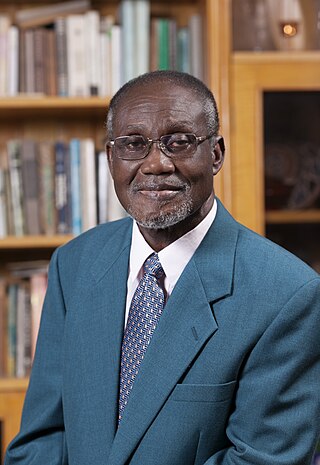
Obed Yao Asamoah is a Ghanaian lawyer, academic and politician. Asamoah was the longest serving foreign minister and Attorney General of Ghana under Jerry Rawlings from 1981 to 1997. Asamoah was educated at King's College London and at Columbia University.

General elections were held in the Gold Coast on 17 July 1956. The result was a victory for Kwame Nkrumah's Convention People's Party, which won 71 of the 104 seats.

A constitutional referendum was held in Ghana on 31 January 1964. The proposed amendments to the constitution would turn the country into a one-party state and increase the powers of President Kwame Nkrumah and make him president for life. With results showing that an implausible 99.91% of voters supported the amendments, the referendum was accused of being "obviously rigged". Voter turnout was reported to be 96.5%.

Parliamentary appointments were held in Ghana in 1965. As the country was a one-party state at the time, no parties except President Kwame Nkrumah's Convention People's Party (CPP), were allowed to participate. All candidates were appointed by the President and his party.
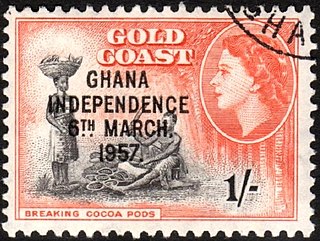
Ghana gained independence from the British on 6 March 1957. It is a member of the Commonwealth of Nations. The country became a republic on July 1, 1960.

The 1963 Togolese coup d'état was a military coup that occurred in the West African country of Togo on 13 January 1963. The coup leaders — notably Emmanuel Bodjollé, Étienne Eyadéma and Kléber Dadjo — took over government buildings, arrested most of the cabinet, and assassinated Togo's first president, Sylvanus Olympio, outside the American embassy in Lomé. The coup leaders quickly brought Nicolas Grunitzky and Antoine Meatchi, both of whom were exiled political opponents of Olympio, together to form a new government.
The National Reconciliation Commission was established in January 2002 by the Parliament of Ghana. The goal of the commission was to establish an "accurate, complete and historical record of violations and abuses of human rights inflicted on persons by public institutions and holders of public office during periods of unconstitutional government." The Commission was formed after a new democratic party won the elections in 2000. The Commission covered human rights violations in Ghana from 1957 to 1993. It looked into government abuses and military coups staged by former president Jerry Rawlings. The members of the Commission worked until the end of 2004.
Kofi Adumua Bossman was a Ghanaian barrister, a jurist and a politician. He was a prominent legal practitioner based in Accra in the 1940s and 1950s prior to being called to the bench. He was a Supreme Court Judge during the first republic. He was dismissed in 1964. In 1966 he was appointed as a member of the constitutional commission during the National Liberation Council (NLC) regime.

The Political history of Ghana recounts the history of varying political systems that existed in Ghana during pre-colonial times, the colonial era and after independence. Pre-colonial Ghana was made up of several states and ethnic groups whose political system was categorized by 3 main administrative models; Centralized, Non-centralized and Theocratic states. In the colonial era, the British Empire employed different forms of government among its four territorial possessions in the Gold Coast. Indirect rule was implemented in the late 19th century after its success in Northern Nigeria. From the 1940s, native Ghanaians yearned for more autonomy. This resulted in the several constitutional reforms as well as the creation of the office of the Prime Minister in 1952.
















